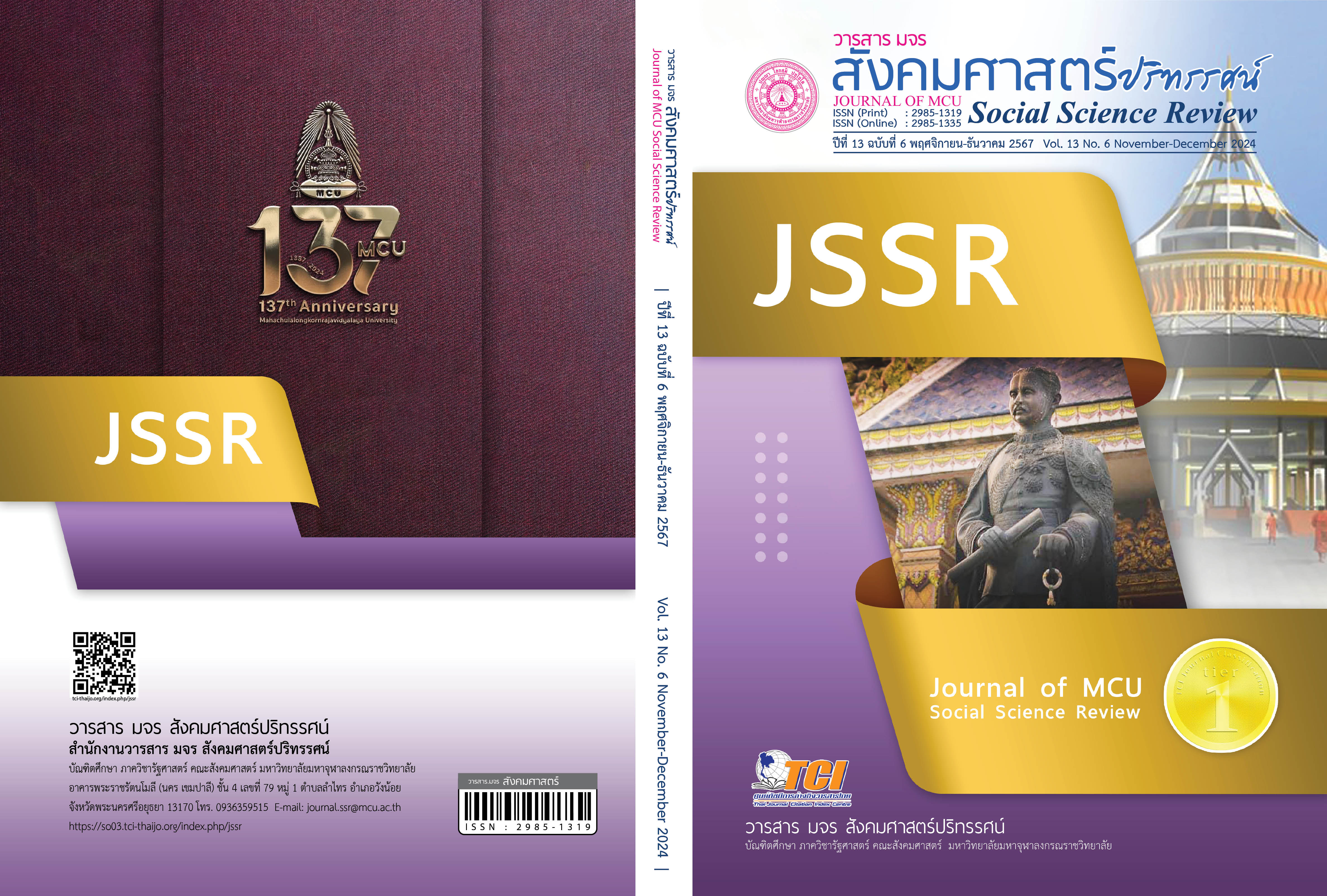การจัดการห่วงโซ่อุปทานสีเขียวและความสามารถทางนวัตกรรมที่ส่งผลต่อผลการดำเนินงานของอุตสาหกรรมสิ่งทอและเครื่องนุ่งห่มในประเทศไทย
คำสำคัญ:
การจัดการ, ห่วงโซ่อุปทานสีเขียว, ความสามารถทางนวัตกรรม, ผลการดำเนินงาน, อุตสาหกรรมสิ่งทอและเครื่องนุ่งห่มบทคัดย่อ
บทความวิจัยนี้มีวัตถุประสงค์ 1. ศึกษาการจัดการห่วงโซ่อุปทานสีเขียว และ 2. ความสามารถทางนวัตกรรมที่ส่งผลต่อผลการดำเนินงานของอุตสาหกรรมสิ่งทอและเครื่องนุ่งห่มในประเทศไทย เป็นการวิจัยเชิงปริมาณ กลุ่มตัวอย่างที่ใช้ในการวิจัย ได้แก่ ผู้ประกอบการอุตสาหกรรมสิ่งทอและเครื่องนุ่งห่มในประเทศไทย จำนวน 350 คน ใช้แบบสอบถามเป็นเครื่องมือในการวิจัย วิเคราะห์ข้อมูลด้วยสถิติเชิงพรรณนา ได้แก่ ความถี่ ค่าร้อยละ ค่าเฉลี่ย ส่วนเบี่ยงเบนมาตรฐาน และการวิเคราะห์ข้อมูลด้วยสถิติเชิงอนุมาน เพื่อทดสอบสมมติฐานด้วยการวิเคราะห์การถดถอยแบบพหุคูณ
ผลการศึกษาพบว่า 1. การจัดการห่วงโซ่อุปทานสีเขียว ด้านการผลิตสีเขียว และด้านการออกแบบสีเขียว ส่งผลทางบวกต่อผลการดำเนินงานของอุตสาหกรรมสิ่งทอและเครื่องนุ่มห่มในประเทศไทย อย่างมีนัยสำคัญทางสถิติที่ระดับ 0.05 และ 2. ความสามารถทางนวัตกรรม ด้านผลิตภัณฑ์ ด้านการตลาด และด้านองค์กร ส่งผลทางบวกต่อผลการดำเนินงานของอุตสาหกรรมสิ่งทอและเครื่องนุ่มห่มในประเทศไทย อย่างมีนัยสำคัญทางสถิติที่ระดับ 0.01 ทั้งนี้การจัดการห่วงโซ่อุปทานสีเขียวและความสามารถทางนวัตกรรม ร่วมกันพยากรณ์ผลการดำเนินงานร้อยละ 63.8 (Adj = 0.638) บทความวิจัยนี้มีวัตถุประสงค์ 1. ศึกษาการจัดการห่วงโซ่อุปทานสีเขียว และ 2. ความสามารถทางนวัตกรรมที่ส่งผลต่อผลการดำเนินงานของอุตสาหกรรมสิ่งทอและเครื่องนุ่งห่มในประเทศไทย เป็นการวิจัยเชิงปริมาณ กลุ่มตัวอย่างที่ใช้ในการวิจัย ได้แก่ ผู้ประกอบการอุตสาหกรรมสิ่งทอและเครื่องนุ่งห่มในประเทศไทย จำนวน 350 คน ใช้แบบสอบถามเป็นเครื่องมือในการวิจัย วิเคราะห์ข้อมูลด้วยสถิติเชิงพรรณนา ได้แก่ ความถี่ ค่าร้อยละ ค่าเฉลี่ย ส่วนเบี่ยงเบนมาตรฐาน และการวิเคราะห์ข้อมูลด้วยสถิติเชิงอนุมาน เพื่อทดสอบสมมติฐานด้วยการวิเคราะห์การถดถอยแบบพหุคูณ
ผลการศึกษาพบว่า 1. การจัดการห่วงโซ่อุปทานสีเขียว ด้านการผลิตสีเขียว และด้านการออกแบบสีเขียว ส่งผลทางบวกต่อผลการดำเนินงานของอุตสาหกรรมสิ่งทอและเครื่องนุ่มห่มในประเทศไทย อย่างมีนัยสำคัญทางสถิติที่ระดับ 0.05 และ 2. ความสามารถทางนวัตกรรม ด้านผลิตภัณฑ์ ด้านการตลาด และด้านองค์กร ส่งผลทางบวกต่อผลการดำเนินงานของอุตสาหกรรมสิ่งทอและเครื่องนุ่มห่มในประเทศไทย อย่างมีนัยสำคัญทางสถิติที่ระดับ 0.01 ทั้งนี้การจัดการห่วงโซ่อุปทานสีเขียวและความสามารถทางนวัตกรรม ร่วมกันพยากรณ์ผลการดำเนินงานร้อยละ 63.8 (Adj2 = 0.638)
เอกสารอ้างอิง
กรมโรงงานอุตสาหกรรม. (2565). ข้อมูลโรงงาน. สืบค้น 10 สิงหาคม 2565, จาก https://www.diw.go.th/webdiw/search-factory/
กฤตชน วงศ์รัตน์. (2564). การพัฒนาโมเดลความสัมพันธ์เชิงสาเหตุของการมุ่งเน้นการเป็นผู้ประกอบการและความสามารถทางนวัตกรรมธุรกิจที่มีอิทธิพลต่อผลการดำเนินงานของอุตสาหกรรมการผลิต จังหวัดเพชรบุรี. วารสารบัณฑิตศึกษา มหาวิทยาลัยราชภัฏวไลยอลงกรณ์ ในพระบรมราชูปถัมภ์, 15(2), 27-39.
คณิต ไข่มุกด์. (2546). สถิติพื้นฐาน. นครราชสีมา: บริษัทสำนักงานพิมพ์น้ำฝน จำกัด.
เนติธร ประเสริฐวงศ์. (2563). การบริหารลูกค้าสัมพันธ์ที่มีผลต่อความสามารถทางด้านนวัตกรรม และประสิทธิภาพขององค์กร (การศึกษาค้นคว้าอิสระบริหารธุรกิจมหาบัณฑิต สาขาวิชาการบริหารและพัฒนาอุตสาหกรรม). กรุงเทพฯ: มหาวิทยาลัยเกษตรศาสตร์.
ปาริฉัตร ตู้ดำ และ มูหำหมัด สาแลบิง. (2560). โมเดลความสัมพันธ์เชิงสาเหตุขององค์ประกอบที่มีอิทธิพลต่อความสามารถทางนวัตกรรมของธุรกิจอาหารฮาลาลในสามจังหวัดชายแดนภาคใต้ของไทย. MFU CONNEXION: Journal of Humanities and Social Sciences, 6(2), 189-211.
ศูนย์สารสนเทศอัจฉริยะอุตสาหกรรมแฟชั่น. (2564). Thailand’s Textile and Clothing Industry Profile 2021. สืบค้น 28 กันยายน 2565, จาก https://shorturl.asia/o3Fq9
สถาบันพัฒนาอุตสาหกรรมสิ่งทอ. (2565). สถานการณ์อุตสาหกรรมสิ่งทอและเครื่องนุ่งห่มไทย.สืบค้น 9 กันยายน 2565, จาก https://shorturl.asia/GPAM4
สำนักงานส่งเสริมวิสาหกิจขนาดกลางและขนาดย่อม. (2560). แผนปฏิบัติการส่งเสริมวิสาหกิจขนาดกลางและขนาดย่อมรายสาขา อุตสาหกรรมสิ่งทอและเครื่องนุ่งห่ม. สืบค้น 28 กันยายน 2565, จาก https://shorturl.asia/KfHDd
Amjad, A. et al. (2022). Effects of the green supply chain management practices on firm performance and sustainable development. Environmental Science and Pollution Research, 29, 66622–66639.
Darnall, N. & Edwards, D. (2006). Predicting the cost of environmental management system adoption: the role of capabilities, resources and ownership structure. Strategic Management Journal, 27(4), 301-320.
Guide, V. D. R. & Srivastava, R. (1998). Inventory Buffers in Recoverable Manufacturing. Journal of Operations Management, 16(5), 551-568.
Gunday, G. et al. (2011). Effects of innovation types on firm performance. International Journal of Production Economics, 133(2), 662-676.
Jassim, S. et al. (2020). The Impact of Green Supply Chain Management on Firm's Performance. Journal of Information & Knowledge Management, 19(1), 1-16.
Kaplan, R. S. & Norton, D. P. (1996). The Balanced Scorecard: Translating Strategies into Action. Boston: Harvard Business School Press.
Khaleeli, M. et al. (2021). The effect of green marketing, green supply chain and green human resources on business performance: Balanced scorecard approach. Uncertain Supply Chain Management, 9(1), 133-138.
Le, T. T. (2020). The effect of green supply chain management practices on sustainability performance in Vietnamese construction materials manufacturing enterprises. Uncertain Supply Chain Management, 8(1), 43-54.
Ochieng, O. S. (2016). Green Supply Chain Management Practices and performance of ISO 14001 Certified Manufacturing Firms in East Africa. DBA Africa Management Review, 6(3), 103-128.
OECD, Oslo Manual. (2005). Proposed Guidelines for Collecting and Interpreting Technological Innovation Data (3rd ed.). Paris: 75775 Paris Cedex.
Srisawat, S. & Srisawat, N. (2020). The Effect of Green Supply Chain Management Practices on the Sustainable Performance of the Textile Industry. International Journal of Supply Chain Management, 9(2), 300-308.
Tuan, N. et al. (2015). The Effects of Innovation on Firm Performance of Supporting Industries in Hanoi – Vietnam. Journal of Industrial Engineering and Management, 9(2), 413-431.
Ullah, Z. & Arshad, H. (2021). Impact of Internal Innovation on Firm performance with moderating role of collaborative innovation (Master Thesis in Business Administration). Gävle.: University of Gävle.
ดาวน์โหลด
เผยแพร่แล้ว
รูปแบบการอ้างอิง
ฉบับ
ประเภทบทความ
สัญญาอนุญาต
ลิขสิทธิ์ (c) 2024 วารสาร มจร สังคมศาสตร์ปริทรรศน์

อนุญาตภายใต้เงื่อนไข Creative Commons Attribution-NonCommercial-NoDerivatives 4.0 International License.
เพื่อให้เป็นไปตามกฎหมายลิขสิทธิ์ ผู้นิพนธ์ทุกท่านต้องลงลายมือชื่อในแบบฟอร์มใบมอบลิขสิทธิ์บทความให้แก่วารสารฯ พร้อมกับบทความต้นฉบับที่ได้แก้ไขครั้งสุดท้าย นอกจากนี้ ผู้นิพนธ์ทุกท่านต้องยืนยันว่าบทความต้นฉบับที่ส่งมาตีพิมพ์นั้น ได้ส่งมาตีพิมพ์เฉพาะในวารสาร มจร สังคมศาสตร์ปริทรรศน์ เพียงแห่งเดียวเท่านั้น หากมีการใช้ภาพหรือตารางหรือเนื้อหาอื่นๆ ของผู้นิพนธ์อื่นที่ปรากฏในสิ่งตีพิมพ์อื่นมาแล้ว ผู้นิพนธ์ต้องขออนุญาตเจ้าของลิขสิทธิ์ก่อน พร้อมทั้งแสดงหนังสือที่ได้รับการยินยอมต่อบรรณาธิการ ก่อนที่บทความจะได้รับการตีพิมพ์ หากไม่เป็นไปตามข้อกำหนดเบื้องต้น ทางวารสารจะถอดบทความของท่านออกโดยไม่มีข้อยกเว้นใดๆ ทั้งสิ้น





